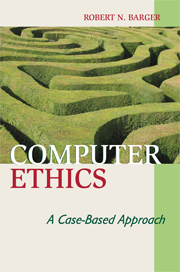Book contents
- Frontmatter
- Contents
- Preface
- Acknowledgments
- 1 Introduction
- 2 The Computer as a Humanizing Agent
- 3 Philosophic Belief Systems
- 4 A Philosophic Inventory
- 5 The Possibility of a Unifying Ethical Theory
- 6 The Ethical Decision-Making Process
- 7 Psychology and Computer Ethics
- 8 The Computing Field as a Profession
- 9 Computer-Related Codes of Ethics
- 10 Computer Ethics and International Development
- 11 Robotics and Ethics
- 12 Theft and Piracy Concerns
- 13 Cases Concerning Theft and Piracy
- 14 Privacy Concerns
- 15 Cases Concerning Privacy
- 16 Power Concerns
- 17 Cases Concerning Power
- 18 A Miscellaneous Collection of Cases
- 19 Parasitic Computing Case
- Appendix: Topics for Presentations, Discussions, and Papers
- Notes
- Selected Bibliography
- Index
14 - Privacy Concerns
Published online by Cambridge University Press: 05 June 2012
- Frontmatter
- Contents
- Preface
- Acknowledgments
- 1 Introduction
- 2 The Computer as a Humanizing Agent
- 3 Philosophic Belief Systems
- 4 A Philosophic Inventory
- 5 The Possibility of a Unifying Ethical Theory
- 6 The Ethical Decision-Making Process
- 7 Psychology and Computer Ethics
- 8 The Computing Field as a Profession
- 9 Computer-Related Codes of Ethics
- 10 Computer Ethics and International Development
- 11 Robotics and Ethics
- 12 Theft and Piracy Concerns
- 13 Cases Concerning Theft and Piracy
- 14 Privacy Concerns
- 15 Cases Concerning Privacy
- 16 Power Concerns
- 17 Cases Concerning Power
- 18 A Miscellaneous Collection of Cases
- 19 Parasitic Computing Case
- Appendix: Topics for Presentations, Discussions, and Papers
- Notes
- Selected Bibliography
- Index
Summary
Introduction
There is sometimes a relationship between theft and privacy. Theft and related crimes, such as fraud, often occur after one's personal information has been compromised. In fact, compromised personal information can be the very means used to commit the crimes.
It used to be said that you need not be concerned about privacy unless you have something to hide. Now, most people understand that everyone should have something to hide, that is, personal information that can be used for identity theft or other kinds of fraud. In this chapter we will be talking about matters related to the privacy of information – information that can be used for good, or for bad, purposes.
Cookies
Something as yummy as a cookie doesn't sound like it could be a bad thing, does it? Usually it's not. We're talking here about electronic cookies, of course. They are bits of information sent to a browser by a Web server when contact is first made with it. Some servers place cookies on browsers that contact them, but not all of them do. If placed, the cookie is stored on the browser's computer and the information on it can be accessed the next time the browser is used to visit the Web server that placed the cookie. For instance, have you ever revisited a server and had the server call you by name. How could it do that?
Information
- Type
- Chapter
- Information
- Computer EthicsA Case-based Approach, pp. 177 - 185Publisher: Cambridge University PressPrint publication year: 2008
Accessibility standard: Unknown
Why this information is here
This section outlines the accessibility features of this content - including support for screen readers, full keyboard navigation and high-contrast display options. This may not be relevant for you.Accessibility Information
- 1
- Cited by
